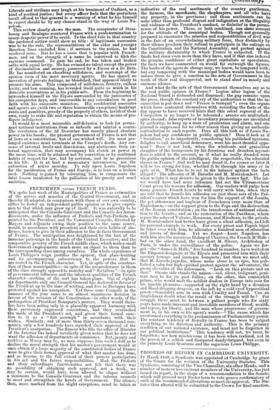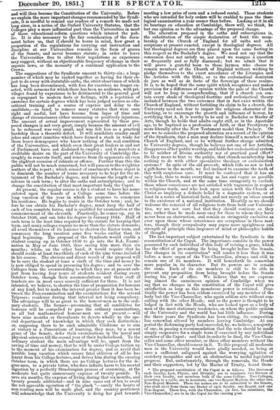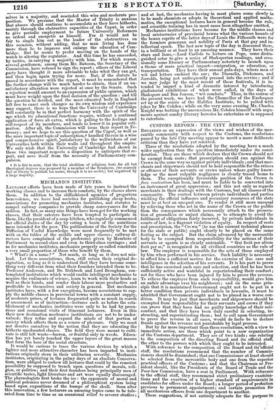PROGRESS OF REFORM /N CAMBRIDGE UNIVERSITY. IN March 1849, a
Syndicate was appointed at Cambridge by grace of the Senate for the revision of the University Statutes. This Syndicate, consisting of the Vice-Chancellor, six other Heads, and a number of more or less eminent members of the University, has just issued its report, in the shape of a recommendation to the Senate, which will proceed next Easter term to vote graces confirmatory of such of the recommended alterations as meet its approval. The Sta- tutes thus altered will be submitted to the Crown for final sanction, aileVrill thea become the Constitution of the University. Before we explain the more important changes recommended by the Syndi- cate, it is needful to remind our readers of a remark we made not long since, in a notice of the Oxford University Statutes, that the Colleges play a more influential part than the Universities in most of those educational-reform questions which interest the pub- lic. It is also necessary to the fair consideration of the docu- ment before us, that it should be borne in mind, how great a. proportion of the regulations for carrying out instruction and. discipline at our Universities remains in the form of graces of the Senate, and never becomes statute ; in order to leave the Universities free to alter their regulations as experience may suggest, without an objectionable frequency of change in their organic laws, or the necessity of a continual application to the Crown.
The suggestions of the Syndicate amount to thirty-six ; a large number of which may be ranked together as having for their ob- ject to do away with statutable oaths, the strict observance of which has long been discontinued, with fees for exercises no longer ex- acted, with sermons for which there has been no audience, with pri- vileges found by experience to be detrimental to the general good or repugnant to modern facts or feelings, with a repetition of exercises for certain degrees which has been judged useless as edu- cational training and a source of expense and delay to the candidate,—in brief, to remove many statutes that were once right and useful, but have become from lapse of time and change of circumstances either unmeaning or positively injurious. The amount of actual improvement represented by these pro- posed changes is not very great, simply because the amount of evil to be redressed was very small, and was felt less as a practical hardship than a theoretic defect. It will annihilate sundry small jokes and smart inanities which have formed a stock in trade for those lesser demagogues who know nothing of the real condition of the Universities, and which even their great leaders in and out of Parliament have not disdained to employ ; and it manifests a creditable desire on the part of the University of Cambridge tho- roughly to renovate itself, and remove from its opponents all even the slightest occasion of ridicule or offence. Further than this the public will not be much concerned, but will pass on to the weightier matters of the report ; which consist of enactments whose object is to diminish the number of terms necessary to be kept for the at- tainment of the Bachelor's degree, and, increase the length of re- sidence in each term ; to alter the oaths and subscriptions ; and to eloinge the constitution of that most important body the Caput.
At present, the regular course is for a student to have his name entered upon the boards of a College some time before the long vacation of the year in which he proposes to commence his reaidence. He begins to reside in the October term ; and, be- foie he can obtain his Bachelor's degree, must keep the half of each of ten complete terms, and is qualified for examination at the commencement of the eleventh. Practically, he comes up, say in October 1850, and can take his degree in January 1854. Half of each term is the least time required by the statute for keeping that term, and many colleges require no more than the statute demands ; all avail them/elves of its lenience to shorten the Easter term, and commence the long vacation some five weeks earlier than its legal beginning. The proposal of the Syndicate would enable a student coming up in October 1850 to go into the B.A. Exami- nation in May or June 1853, thus saving him more than six months ; while, on the other hand, it would require that he should reside at least two-thirds of each of the nine terms included in his course. The obvious and direct result of the proposal will be to save the student at least a sixth of the time and money he is now obliged to spend in procuring his degree ; and to save the Colleges from the overcrowding to which they are at present sub- ject from having four years of students resident during every October term, though their accommodations and their staff of teachers are in most cases scarcely sufficient for three. It is not intended, we believe, to shorten the time of preparation for honours of any kind, but to make the interval greater than it has been be- tween the Pass-examination and the examinations for the several Triposes; residence during that interval not being compulsory. The advantage will be as great to the honour-men as to the ordi- nary students. The former—presuming that all candidates for honours will be compelled to pass the ordinary examinations, as all but mathematical honour-men are at present — will have nine months or thereabouts to devote wholly to the spe- cial department of knowledge in which they seek distinction ; or, supposing there to be such admirable Crichtons as to aim at victory in a Pancratium of learning, they may, by a recent grace of the Senate, defer their examinations in the moral and physical sciences till the second year of their bachelorhood. To the ordinary student the main advantage will be, apart from the saving of time and money, that he will be under College tuition up to the moment of his examination for degree, and so avoid that terrible long vacation which causes fatal oblivion of all he has learnt from his College lectures, and drives him during the ensuing October term, in which there are no College lectures for the de- gree-men, to a private tutor, who does infinite harm to his mental digestion by a perfectly Strasburgian process of cramming, at the moderate but quite unnecessary expense of twenty pounds. To save six months, the expense of living. during that six months, and twenty pounds additional—and in nine cases out of ten to avoid the not agreeable operation of "the pluck "—surely the hearts of non-reading men will be made glad, and the country gentlemen will acknowledge that the University is doing her part towards
meeting a low price of corn and a reduced rentaL Those studenta who are intended for holy orders will be enabled to pass the theo- logical examination a year sooner than before. Looking at it in all its bearings on education at Cambridge, there will, we think, be but one opinion as to the advantage of the proposed change. The alteration proposed in the oaths and subscriptions is, the substitution of the simple declaration of bona fide mem- bership of the Church of Rngland for all oaths and sub- scriptions at present exacted, except in theological degrees. .A.11 but theological degrees are thus placed upon the same footing in this respect as the Bachelor's degree. We need not say that the concession does not satisfy us, nor need we reargue a question so frequently and so fully discussed ; but we admit that it will prove a grateful boon to those laymen who choose to remain members of the Church of England without wishing to pledge themselves to the exact accordance of the Liturgies and the Articles with the Bible, or to the ecclesiastical dominion de jure as well as de facto of the Sovereign of these realms. It is to be hoped that the same spirit which recognizes and makes provision for a difference of opinion within the pale of the Church will not be long in comprehending, that if a church can con- tain every shade of theological doctrine and ecclesiastical theory included between the two extremes that in feet exist within the Church of England, without forfeiting its claim to be a church, the University need not fear to impair the religious character of its teaching, or to encourage the growth and influence of heresy, by certifying that A. B. is worthy to be and is Bachelor or Master of Arts, though he holds that adults ought still, as in the Apostolie age, to be baptized as a profession of faith, or that Presbytery is more literally after the New Testament model than Prelacy. Or are we to consider the proposed alteration as a record of the opinion of the Syndicate, that a man may declare himself a member of the Church of England, and so be without further change admitted to University degrees, though he believes not one of her Articles, disapproves of her public worship, and holds her ecclesiastical system to be neither of Divine authority nor of practical good effect ? Do they mean to hint to the public, that church-membership has nothing to do with either speculative theology or ecclesiastical systems ? In spite of the old proverb, which tells us not to look a gift-horse in the mouth, we feel inclined to examine the teeth of this with suspicious care. It must be confessed that it has an ugly look, thus to make everything as lax and vague as possible within the Church, and at the same time stringently to exclude those whose consciences are not satisfied with vagueness in respect to religious truth, and who look upon union with the Church of Christ as implying a definite belief in a dogmatic system, or at least in a series of historical facts, and not merely an otiose assent to the existence of a national institution. Heartily as we should welcome the removal of all religious tests from both our Universi- ties, we are not sure but that they should continue as they are, rather than be made more easy for those to whom they have never been an obstruction, and remain as stringently exclusive as ever upon those whose consciences are scrupulous in these mat- ters, though their scrupulosity may argue more uprightness and strength of principle than largeness of mind or philosophic habits of thought.
The last important subject entertained by the Syndicate is the reconstitution of the Caput. The importance consists in the power possessed by each individual of this body of vetoing a grace, which has the effect of preventing its being brought before the Senate. The changes in its constitution* will render it less than it was before a mere organ of the Vice-Chancellor, always and still to remain one of its members. It will henceforth be somewhat more popular in its character. But its powers are to remain the same. Each of its six members is still to be able to prevent any proposition from being brought before the Senate during his year of office. We believe that we are express- ing almost the unanimous opinion of Cambridge when we say that no changes in the constitution of the Caput will give satisfaction so long as this monstrous power is retained. Prac- tically the power has been seldom exercised by any member of the body but the Vice-Chancellor, who again seldom acts without con- sulting with the other Heads ; and so the power is thought to be lodged in fact with the Heads, who are looked upon as a body of men of the most stationary tendencies, on whom the public opinion of the University and the world has but little influence. During the three years the Syndicate has been sitting, its composition has somewhat altered by members leaving Cambridge. At one period the Reforming party had succeeded, by, we believe, a majority of one, in passing a recommendation that the veto should be made simply suspensive for a single term if exercised by any individual member of the Caput ; and that in order to be final, the Vice-Chan- cellor and some other member, or three other members without the Vice-Chancellor, should concur in it. To this proposal all moderate men in the University would have gladly acceded, as being at once a sufficient safeguard against the worrying agitation of crotchety incapables and not an obstruction to useful legislative progress. But, unfortunately, through the removals, the Heads and their supporters, led by the Master of Trinity, found them.-
* The proposed constitution of the Caput is es follows. The Doctors of each faculty, Law, Physic, and Divinity, are to nominate two Doctors of their own faculty, not members both of the same College. Two Colleges, according to a cycle, are to nominate, one two Regent Masters, the other two Non-Regent Masters. These ten names are to be submitted to the Senate, who shall elect from them one Doctor of each faculty, one Regent and one Non-Regent. These five, with the Chancellor, (in fad., his substitute, the Vice-Chancellor,) are to be the Caput for the ensuing year.
selves in a majority, and rescinded this wise and moderate pro- position. We presume that the Master of Trinity is anxious that abuses should continue to accumulate as they have hitherto, mainly through the obstructive capacities of the Caput, in order to give periodic employment to future University Reformers as ardent and energetic as himself. For it would not be fair to single him out as the leader of the obstructives on this occasion, without adding, that no man living has done more than he to improve and enlarge the education of Cam- bridge. But he seems to prefer moving on the hands of the watch to altering the regulator. And this time he has succeeded, by tactics, in carrying a majority with him. For which reason, several gentlemen, among them Mr. Bateson, the Secretary of the Commission, have refused to sign the report ; others of the Liberal party have thought it more advisable to take what they can get, and then begin again trying for more. But, if the statute be wsed in accordance with the report, it must be remembered that the further change will be much harder to obtain, than if an un- satisfactory alteration were rejected at once by the Senate. Such a rejection would amount to an expression of public opinion, which must have weight upon the final decision of the question : and till the question be decided, and the most educated body in England left free to enact such changes as its own wisdom and experience may suggest, there is no hope that the University of Cambridge will constantly be in that perfect harmony with the spirit of the age which its educational functions require, without a continual application of force ab extra, which is gelling to the feelings and self-respect of its members, and tends to lower it in popular esti- mation. After all, the Commission will issue their report in Fe- bruary; and we hope to see this question of the Caput, as well as the more important topic of subscription,t handled therein in a wise and comprehensive spirit, ;satisfactory to the welleishers of our Universities both within their walls and throughout the empire. We only wish that the University of Cambridge had shown in these two important respects a disposition to anticipate that re- port, and save itself from the necessity of Parliamentary com- pulsion.
t It is fair to note, that the total abolition of religious tests for all but theological degrees was proposed by a member of the Syndicate, (we scarcely feel at liberty to publish his name, though it is no secret,) but negatived by a large majority.




































 Previous page
Previous page